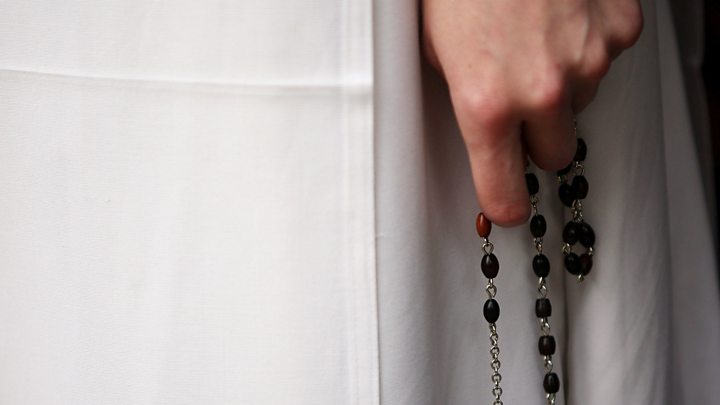Australia abuse: Archbishop rejects call to report confessions

A senior member of the Roman Catholic Church in Australia has rejected a key recommendation of a landmark inquiry into child sex abuse.
It said priests should report abuse confided to them, even in the secret context of the confessional.
But the archbishop of Melbourne said any priest who broke the seal of confession would be excommunicated.
This means they would cease to be a member of the Church and would no longer be allowed a Catholic funeral.
The Most Rev Denis Hart said a law requiring this of priests would undermine a central tenet of Catholicism, the sacredness of the confessional.
"The seal of the confessional, or the relationship with God that's carried through the priest and with the person, is inviolable," he said.
In a statement, the Vatican said the report "deserved to be studied seriously".
The five-year inquiry's final report said institutions had "seriously failed" to protect children.
Letters from survivors
These institutions included the churches and the report found that 62% of abuse cases in religious institutions were in Catholic institutions.
Religious ministers and school teachers were the most commonly reported perpetrators, the report said.
- Catholic Church 'abused 4,400 children' in Australia
- Anglican Church receives 1,115 abuse complaints
- Jehovah's Witness church 'hid 1,000 alleged abusers'
The report also called on the Catholic Church to overhaul its celibacy rules
The royal commission, Australia's highest form of public inquiry, heard more than 8,000 testimonies from victims of abuse, with accusations covering schools, churches and sports clubs over decades.
"It is not a case of a few rotten apples," the report said. "Society's major institutions have seriously failed... The problems have been so widespread, and the nature of the abuse so heinous, that it is difficult to comprehend."
Since 2013, the royal commission has referred more than 2,500 allegations to authorities.
Prime Minister Malcolm Turnbull said "a national tragedy" had been exposed.
Who did the inquiry speak to?
The Royal Commission into Institutional Responses to Child Sexual Abuse had the power to look at any private, public or non-government body involved with children.
It was contacted by more than 15,000 people. More than 8,000 victims told their stories, many for the first time.
The scope of the inquiry
2559
allegations referred to police since the inquiry began in 2013
-
230 prosecutions have commenced
-
41,770 calls received from members of the public
-
60,000 survivors may be eligible for compensation, estimates say
The commission also received more than 1,300 written accounts and held 57 public hearings across the nation. Allegations were raised against more than 4,000 institutions.
What did it recommend?
The report on Friday urged Australian Catholic bishops to petition the Vatican to amend canon law to allow priests to report sexual abuse disclosed to them during confession.
It also said the Catholic Church should consider making celibacy voluntary for priests because while it was "not a direct cause of child sexual abuse", it had "contributed to the occurrence of child sexual abuse, especially when combined with other risk factors".
Among its other major findings, the inquiry recommended:
- A nationally implemented strategy to prevent child sex abuse
- A system of preventative training for children in schools and early childhood centres
- A national office for child safety, overseen by a government minister
- Making it mandatory for more occupations, such as religious ministers, early childhood workers and registered psychologists, to report abuse.
Survivor accounts: Extracts from the final report
- "Gerry Ann" said she had "lived in a climate of fear" at the orphanage where she grew up. "My time at [the orphanage] robbed me of my innocence, and set the benchmark of who I would become: frightened, petrified, scared, fearful, not worthy, introverted, isolated, segregated, sad and constantly suicidal"
- "Brianna" has spent her childhood in out-of-home care. She said at age five, she remembered being physically beaten. Her foster father, "Sherman", beat her with a pool cue as her sister hid under the table. He began sexually abusing her soon after she moved in. Brianna said that on at least one occasion her foster mother encouraged Brianna's sister to sleep in Sherman's bed
- Like many Aboriginal and Torres Strait Islander survivors in out-of-home care, "Raquel" was subjected to harsh treatment by the foster family, describing them as "cruel pigs". She said she was whipped with a bamboo stick among other physical and emotional abuses
*Names have been changed in the report to protect the identities of the survivors.